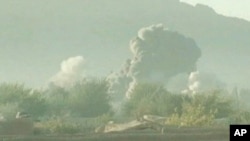As the battle for control of Kandahar Province continues, efforts at reconciliation are also moving ahead. President Obama plans, by December, to reassess his strategy, based on progress made in breaking the back of the Taliban at least in Kandahar. While the U.S. military remains optimistic, some analysts say the optimism should be tempered based on what they saw on the ground.
Battles between NATO troops and Taliban fighters continue in Afghanistan's southern Kandahar province. The U.S. military sees the conflict in Kandahar as a potential indicator of how well President Obama's surge is working. Mr. Obama plans to re-assess that strategy next month.
"I have to say it is still hard fighting, it is work in progress," said NATO Brigadier General Josef Blotz. "It will take some more weeks and months to actually completely clear the entire area of Kandahar city and the contiguous districts "
Reporting in the U.S. media is often contradictory. Some reports say NATO is making steady progress ahead of the December deadline. Others say the Taliban is melting away rather than fight.
Two reporters who recently returned from Afghanistan say the optimism must be tempered to take account of the reality on the ground. They spoke at the New American Foundation in Washington.
Karen DeYoung of the Washington Post says now when Taliban fighters try to melt away, NATO troops are going after them. They are even killing from overhead - using drones like this one.
"They say this is having an effect, that the Taliban is getting dispirited, that this has something to do with why some people at least want to talk now or want to reintegrate," she said. "The problem is, at least from a journalistic standpoint, that we have no way to prove this."
Once the troops rout the Taliban, the next step is tougher. NATO troops try to win the trust of local residents.
Anna Badkhen has reported from Afghanistan for several newspapers. She says for some villagers, the Taliban is less of a concern than the Americans. She asked one Afghan if he was worried about the Taliban coming to his village.
"He said, No, I have nothing to worry about the Taliban. I am very religious. I already pray five times a day. My wives already can't go outside because I don't let them. What I am worried about is that when the Taliban are going to come here, then the Americans are going to come here, and raid my house and bomb my village and God forbid they are going to hurt someone and scare my children," Badkhen said.
DeYoung is skeptical about reported talks between the Taliban and the Afghan government. She says it's not certain that the Afghans talking to the government represent the Taliban.
"I think it is not clear at all at this point whether those people who are having these very preliminary talks are having them on behalf of the people who actually have the power to implement any kind of agreement," she said.
Anna Badkhen doubts the Afghan government can lure young Afghans who have joined the Taliban for money, not for ideology. She says the Taliban is already recruiting new fighters from among the thousands of Afghan refugees returning home from Pakistan.
"Now they are coming back because the Karzai government is inviting them back and then it is dumping them in infertile deserts with no access to healthcare, no access to jobs," she said. "These people are being recruited by the Taliban in the north."
Some analysts say the military is the only group in or outside Afghanistan that sees progress. The NGO workers, election monitors, and longtime residents the two reporters spoke to saw nothing but gloom.




